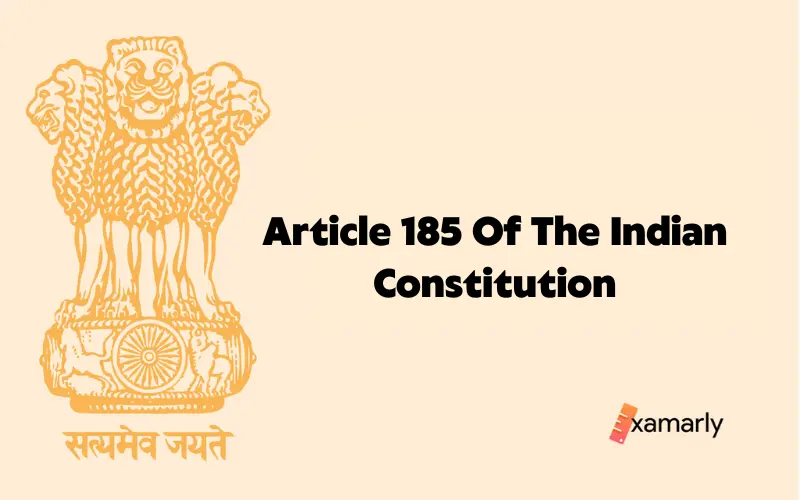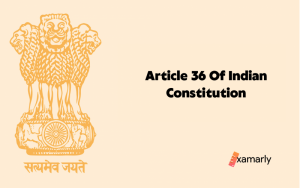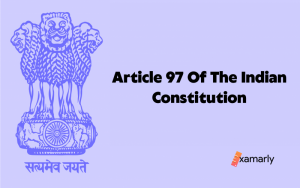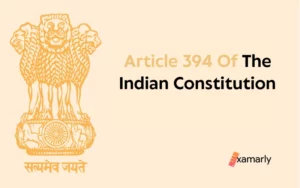Article 185 of the Indian Constitution talks about the constitutional provisions that are adhered to while the process of the removal of the office of Chairman or the Deputy Chairman of the State Legislative Council is underway.
Find out what goes on during this process at the proceedings of the Legislative Council and an in-depth analysis of the clauses of Article 185 of the Indian Constitution through this article.
- What Is Article 185 Of The Indian Constitution All About?
- Explanation Of Article 185 Of The Indian Constitution
- Clause (1) Of Article 185 Of The Indian Constitution: Explained
- Clause (2) Of Article 185 Of The Indian Constitution: Explained
- Summing Up
- FAQs
- What Does Clause (2) Of Article 184 Of The Indian Constitution State?
- How Is The Removal Of The Chairman Or The Deputy Chairman Proceeded In The Legislative Council?
- How Many Clauses Does Article 185 Of The Indian Constitution Contain?
- What Does Article 189(1) Of The Indian Constitution Talk About?
- Which Article Of The Indian Constitution Is Mentioned In Clause (2) Of Article 185 Of The Indian Constitution?
- What Is The State Legislative Council Also Known As?
What Is Article 185 Of The Indian Constitution All About?
The official document of the Constitution of India quotes Article 185 as follows:
“185. The Chairman or the Deputy Chairman not to preside while a resolution for his removal from office is under consideration.—
(1) At any sitting of the Legislative Council, while any resolution for the removal of the Chairman from his office is under consideration, the Chairman, or while any resolution for the removal of the Deputy Chairman from his office is under consideration, the Deputy Chairman, shall not, though he is present, preside, and the provisions of clause (2) of article 184 shall apply in relation to every such sitting as they apply in relation to a sitting from which the Chairman or, as the case may be, the Deputy Chairman is absent.
(2) The Chairman shall have the right to speak in, and otherwise to take part in the proceedings of, the Legislative Council while any resolution for his removal from office is under consideration in the Council and shall, notwithstanding anything in article 189, be entitled to vote only in the first instance on such resolution or on any other matter during such proceedings but not in the case of an equality of votes.”
Explanation Of Article 185 Of The Indian Constitution
Let us now look at the this article in details and try to analyse the clauses mentioned in the article individually.
Article 185 clearly mentions that the Chairman as well as the Deputy Chairman shall hold no power in office while a resolution for his removal is in process. There are two clauses which further throw light on the protocols that are to be maintained while such a resolution is being discussed in the Legislative Council.
Clause (1) Of Article 185 Of The Indian Constitution: Explained
Clause (1) of the article states that whenever a resolution for the removal of the Chairman is underway at any sitting of the Legislative Council, he is no longer authorised to be in a position of power. Similarly, when a resolution for the Deputy Chairman is in talks, he shall not preside his position. In short, even though both these prominent authorities might be present, when the resolution for either of their removal from office is a matter of discussion is in the Legislative Council, neither of them has any power to preside over their positions.
It further states that clause (2) of Article 184 shall be applicable in all of such sittings of the Legislative Council as it applies when either the Chairman or the Deputy Chairman is not present in any sitting of the Council.
Clause (2) Of Article 185 Of The Indian Constitution: Explained
The second clause of this article explains that during any sitting of the Legislative Council where the resolution for the removal of the Chairman is being discussed, he is granted with the right to share his opinion and be a part of such proceedings. He shall not be exempted from any of these.
In addition to that, the clause also mentions that despite anything mentioned in Article 189, if any such proceeding requires the attendees to vote for addressing any matter, the Chairman is allowed to vote only once. In cases where an equality of votes is achieved with no clear-cut distinction, the Chairman is not eligible to vote at all.
Summing Up
To sum it up, we can say that Article 185 highlights the procedures to be taken care of while the matter of the removal of the Chairman is in process.
Neither the Chairman himself nor the Deputy Chairman can preside over their positions during this time. Besides that, the provisions of clause (2) of Article 184 shall apply to every such sitting in the same way that they apply to a sitting in which the Chairman or, as the case may be, the Deputy Chairman is absent.
FAQs
What Does Clause (2) Of Article 184 Of The Indian Constitution State?
Clause (2) also renders special powers to the Deputy Chairman or any member in the absence of the Chairman.
If the Chairman, due to absenteeism fails to serve as the head of any sitting of the Council, then the Deputy Chairman shall preside in his place. In case the Deputy Chairman is absent as well, then the rules of procedure of the Council must be used to appoint any such member who can substitute for the Chairman along with the Deputy Chairman.
Further, if no such person is present, then the Council must hold a discussion to appoint a member to act as the Chairman in his place.
How Is The Removal Of The Chairman Or The Deputy Chairman Proceeded In The Legislative Council?
The removal of the Chairman or the Deputy Chairman is discussed by means of a resolution in the Legislative Council. While the resolution is in process, none of the two are eligible to preside over their positions, even though they might be present.
How Many Clauses Does Article 185 Of The Indian Constitution Contain?
Article 185 of the Indian Constitution talks about the constitutional provisions that are to be followed while a resolution for the removal of the Chairman or the Deputy Chairman from the office of the State Legislative Council is in process.
Article 185 is further divided into two clauses, namely- clause (1) and clause (2).
What Does Article 189(1) Of The Indian Constitution Talk About?
Article 189(1) states that except as otherwise provided in this Constitution, all questions decided at any sitting of a House of the legislature of a State shall be decided by a majority of votes cast by members present and voting, other than the Speaker or Chairman, or person acting in that capacity, at the time of the question.
The Speaker or Chairman, or any other person acting in that capacity, shall not vote in the first instance, but shall have and exercise a casting vote in the event of a tie of votes.
Which Article Of The Indian Constitution Is Mentioned In Clause (2) Of Article 185 Of The Indian Constitution?
In clause (2) of Article 185 of the Indian Constitution, we find a mention of Article 189. The former clause negates the first clause of Article 189.
What Is The State Legislative Council Also Known As?
The State Legislative Council is also known as the Vidhan Parishad. At present, only six Indian states have the State Legislative Council or the Vidhan Parishad.






